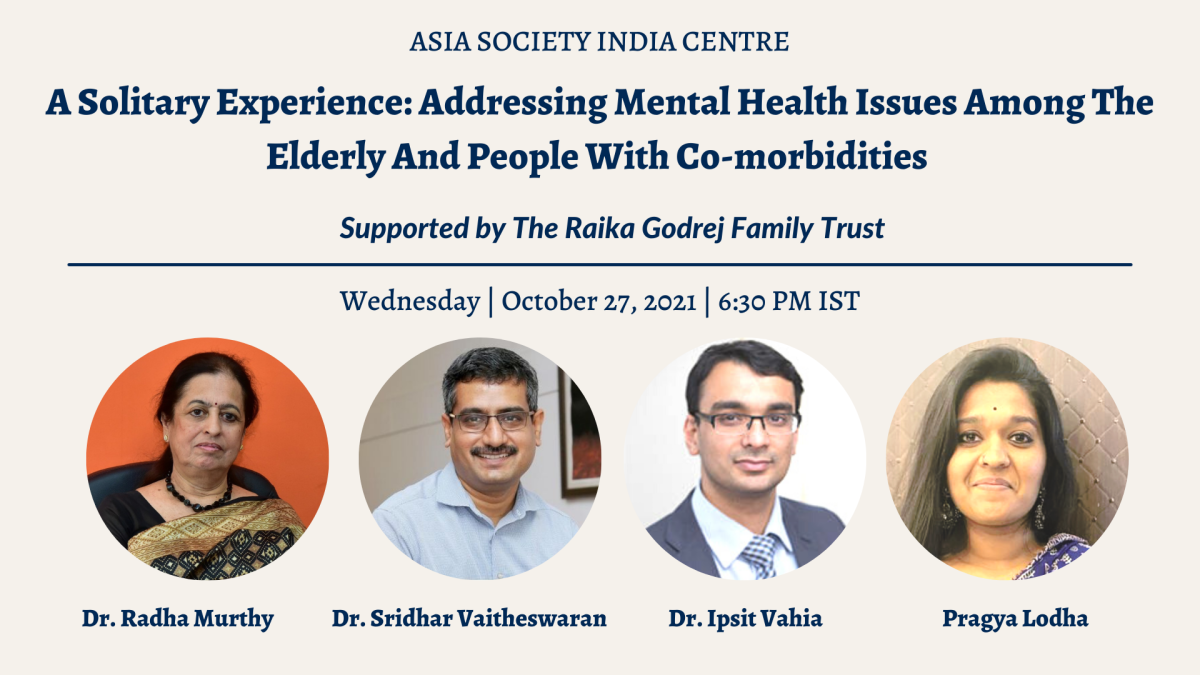A Solitary Experience: Addressing Mental Health Issues Among The Elderly And People With Co-morbidities
VIEW EVENT DETAILS
The global death toll of the COVID-19 pandemic crossed the 5 million mark earlier this month. Studies show that elderly people and those living with life-threatening diseases make up a significantly higher proportion of this statistic. Data provided by the Union Ministry of Health reports an average COVID-19 case fatality rate of 33% for adults in the age group of 41-60 years and 17% for adults above 60 years. Barring these increased risks to physical health, this group is also particularly exposed to mental health disorders that have resulted from the pandemic.
A recent study, ‘Managing mental health issues among the elderly during the COVID-19 pandemic’ notes that pandemic induced mental health risks are leading to various post-traumatic stress disorders and an elevated sense of anxiety amongst the elderly. Recurring lockdowns and home isolation have restricted social contact for them, particularly for those living alone in nursing homes.
“Social isolation among older adults is a ‘serious public health concern’ because of their heightened risk of cardiovascular, autoimmune, neurocognitive, and mental health problems,” observes the study. An immediate after-effect of this isolation has been the loss of sleep and appetite problems. Unfortunately, increased exposure to negative news media and misinformation have further complicated this challenge.
People with multiple comorbidities and chronic conditions such as high blood pressure and diabetes, among others, are another such high-risk group. Since preventing the spread of the virus was the main prerogative of the medical community, during the early days of the pandemic, many essential health services for people living with these illnesses saw a sudden halt, causing a sense of uncertainty and stress. "It is worth mentioning that these patients already have a certain susceptibility to suffer from mental disorders due to their underlying conditions," states a prominent study. These mental health concerns can trigger neurobiological consequences which may harm the physical health of the individual.
According to the World Health Organization, key support mechanisms to address these issues involve a combination of active interactions, providing logistical support for the procurement of essential items, sustained conversations and specialized therapy sessions. “Of particular importance is the role of technology, which has emerged as an important factor for maintaining social connection as well as accessing mental health services,” writes Dr. Ipsit Vahia, Medical Director, McLean Institute for Technology in Psychiatry. Undoubtedly, community-led initiatives and health care workers play an important role in providing these services to this group in these crucial times.
The fear of contracting the virus remains a cause of concern for this population group. How can older adults and people living with comorbidities cope with the stress and anxiety of being a high-risk population? What support systems can reduce difficulties faced by them in adapting to the large digital shift and accessing telemedicine services? As we gradually emerge out of the pandemic, how can healthcare professionals and the community support these individuals in dealing with the loss of loved ones and the impact of social isolation on their mental wellbeing?
Join us for a discussion on how the COVID-19 pandemic has impacted the mental health of the elderly, with Dr. Radha Murthy, Dr. Sridhar Vaitheswaran, Dr. Ipsit Vahia and Pragya Lodha.
This will be the third session of our new virtual series ‘The Invisible Pandemic: Mapping Post-COVID-19 Mental Health Crisis in India’ supported by The Raika Godrej Family Trust.

Dr. Radha Murthy is the Co-Founder & Managing Trustee at the Nightingales Medical Trust. She also serves as President at the Alzheimer’s & Related Disorders Society of India, Bangalore Chapter. Dr. Radha had the honour of being nominated as a member of the Elders Task Force formed by the Karnataka State Government under the Chairmanship of the Chief Minister to monitor and implement state policy for the elderly. She has been awarded the prestigious Rajyotsava Award from the Government of Karnataka in recognition of her community service initiatives in 2003.

Dr. Sridhar Vaitheswaran, MD, MRCPsych, is the Assistant Director & Consultant Psychiatrist, Dementia Care at the Schizophrenia Research Foundation (India) – SCARF, Chennai. He is a clinician with interest in applied research in dementia in low and middle-income country settings. Dr. Vaitheswaran runs a clinic for the elderly with mental illnesses including dementia at the SCARF hospital in Chennai.

Dr. Ipsit Vahia, MD, is a geriatric psychiatrist, clinician, and researcher. He is the medical director of the Geriatric Psychiatry Outpatient Services department at McLean Hospital and the McLean Institute for Technology in Psychiatry. He is also director of the Technology and Aging Laboratory. His research focuses on the use of technology and informatics in the assessment and management of older adults and currently, he oversees a clinical and research program on ageing, behaviour, and technology. Dr. Vahia is based out of Belmont, Massachusetts.

Pragya Lodha is a Consulting Psychologist based in Mumbai and works with 8 national and international organisations in different capacities. She is the Programme Director for The MINDS Foundation, Consulting Psychologist for NGOs and a Mentor for One Future Collective. She is an Advisory Council Member for Witness Change and a teaching faculty for graduate as well as postgraduate students of Psychology.
